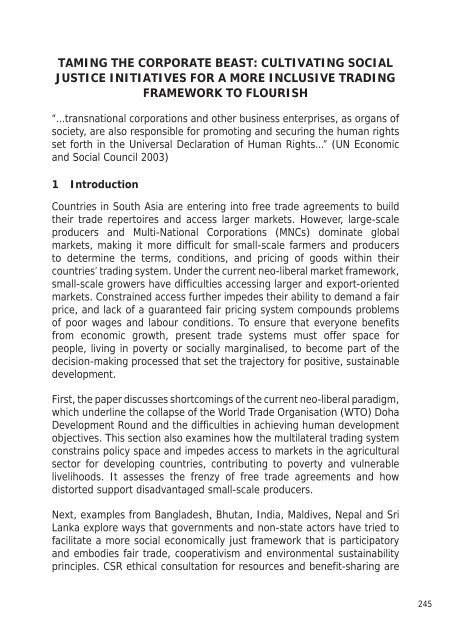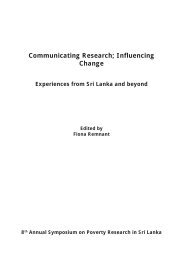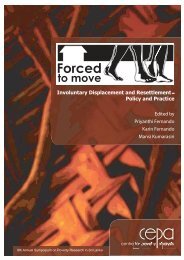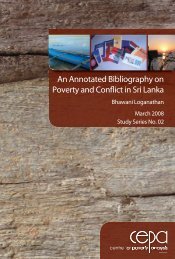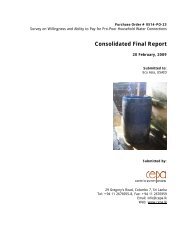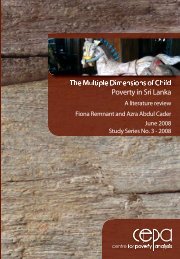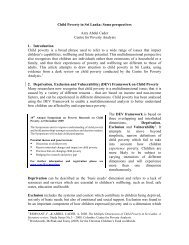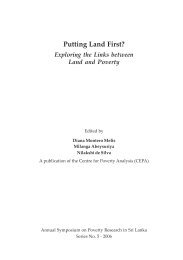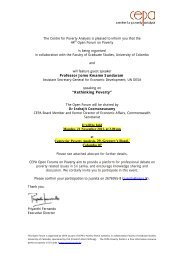- Page 1 and 2:
Does Inequality Matter Exploring th
- Page 3 and 4:
© Centre for Poverty Analysis 2007
- Page 6:
Table of Contents Introduction 1 Ar
- Page 9 and 10:
Poverty Measurement The introductio
- Page 11 and 12:
Poverty Measurement ‘Ethnicity an
- Page 13 and 14:
Poverty Measurement in the area. Cl
- Page 15 and 16:
Poverty Measurement Concepts such a
- Page 17 and 18:
Poverty Measurement programmes, the
- Page 19 and 20:
Poverty Measurement The framework a
- Page 21 and 22:
Poverty Measurement .%yKh lr.ekSug
- Page 23 and 24:
Poverty Measurement ckjd¾.sl;ajh i
- Page 25 and 26:
Poverty Measurement lKavdhï idlÉP
- Page 27 and 28:
Poverty Measurement fojk Èkh lKavd
- Page 29 and 30:
Poverty Measurement • idlÉPdjg n
- Page 31 and 32:
Poverty Measurement f.da,ShlrKh iy
- Page 33 and 34:
Poverty Measurement tWik gw;wpa fUj
- Page 35 and 36:
Poverty Measurement vd;gNj rkh;g;gz
- Page 37 and 38:
Poverty Measurement khjphpnahd;iwg;
- Page 39 and 40:
Poverty Measurement cWjpg;gLj;JtJk;
- Page 41 and 42:
Poverty Measurement mfw;Wjy;> Njhl;
- Page 43 and 44:
Poverty Measurement (buf;lh;fspd; v
- Page 45 and 46:
Poverty Measurement thptpjpg;G nfhs
- Page 47 and 48:
Poverty Measurement rkj;Jtkpd;ikapd
- Page 49 and 50:
Poverty Measurement Among males, es
- Page 51 and 52:
Poverty Measurement hq;= njh’ ta
- Page 53 and 54:
Poverty Measurement ARE THERE DISPA
- Page 55 and 56:
Poverty Measurement raw wage gap be
- Page 57 and 58:
Poverty Measurement earnings distri
- Page 59 and 60:
Poverty Measurement Sample selectio
- Page 61 and 62:
Poverty Measurement the position th
- Page 63 and 64:
Poverty Measurement Sri Lankan Tami
- Page 65 and 66:
Poverty Measurement Tamil men have
- Page 67 and 68:
Poverty Measurement Raw wage gaps F
- Page 69 and 70:
Poverty Measurement the means mask
- Page 71 and 72:
Poverty Measurement There are limit
- Page 73 and 74:
Poverty Measurement Source: Author
- Page 75 and 76:
Poverty Measurement Figure 9: Condi
- Page 77 and 78:
Poverty Measurement Source: Author
- Page 79 and 80:
Poverty Measurement 6. References A
- Page 81 and 82:
Poverty Measurement Table 1: Raw an
- Page 83 and 84:
Poverty Measurement Sinhala Private
- Page 85 and 86:
Poverty Measurement Sinhala Private
- Page 87 and 88:
Poverty Measurement 80
- Page 89 and 90:
Poverty Measurement the village lev
- Page 91 and 92:
Poverty Measurement Each variable i
- Page 93 and 94:
Poverty Measurement wd¾Ól j¾Okhg
- Page 95 and 96:
Poverty Measurement fhdo.d.kq ,enQ
- Page 97 and 98:
Poverty Measurement gpuNjrhPjpahd t
- Page 99 and 100:
Poverty Measurement 4. Ma;tpd; Kiwa
- Page 101 and 102:
Poverty Measurement Kd;Dhpikg;gLj;J
- Page 103 and 104:
Poverty Measurement The objective o
- Page 105 and 106:
Poverty Measurement 1.3 An overview
- Page 107 and 108:
Poverty Measurement Table No. 1.2.
- Page 109 and 110:
Poverty Measurement into the on-goi
- Page 111 and 112:
Poverty Measurement available withi
- Page 113 and 114:
Poverty Measurement 3. Results This
- Page 115 and 116:
Poverty Measurement Figure No. 3.1.
- Page 117 and 118:
Poverty Measurement • There are a
- Page 119 and 120:
Poverty Measurement Table No. 3 - 3
- Page 121 and 122:
Poverty Measurement also impoverish
- Page 123 and 124:
Poverty Measurement 3.6. Aggregated
- Page 125 and 126:
Poverty Measurement facilities, and
- Page 127 and 128:
Poverty Measurement finding is supp
- Page 129 and 130:
Poverty Measurement Firstly, the em
- Page 131 and 132:
Poverty Measurement JACOBY, H. G.,
- Page 133 and 134:
Poverty Measurement Appendices Appe
- Page 135 and 136:
Poverty Measurement 12 Kowilakanda
- Page 137 and 138:
Poverty Measurement 84 Thabbowa-Sou
- Page 139 and 140:
Poverty Measurement Dimensions of v
- Page 141 and 142:
Poverty Measurement Dimensions of v
- Page 143 and 144:
Poverty Measurement The paper then
- Page 145 and 146:
Poverty Measurement fkdùh’ flfia
- Page 147 and 148:
Poverty Measurement gad;gLj;Jgth;fs
- Page 149 and 150:
Poverty Measurement services at the
- Page 151 and 152:
Poverty Measurement well as develop
- Page 153 and 154:
Poverty Measurement selected. The s
- Page 155 and 156:
Poverty Measurement The qualitative
- Page 157 and 158:
Poverty Measurement As such, much o
- Page 159 and 160:
Poverty Measurement developing coun
- Page 161 and 162:
Poverty Measurement Efficiency of d
- Page 163 and 164:
Poverty Measurement Table 6: Main p
- Page 165 and 166:
Poverty Measurement Figure 5: The i
- Page 167 and 168:
Poverty Measurement It emerged stro
- Page 169 and 170:
Poverty Measurement References BAYE
- Page 171 and 172:
Poverty Measurement TRAI, 2006. The
- Page 173 and 174:
Poverty Measurement Table A3. Quant
- Page 175 and 176:
Poverty Measurement 168
- Page 177 and 178:
Poverty Measurement “Lies, damn l
- Page 179 and 180:
Poverty Measurement ngha;fs;> Rj;jg
- Page 181 and 182:
Poverty Measurement LIES, DAMN LIES
- Page 183 and 184:
Poverty Measurement may not necessa
- Page 185 and 186:
Poverty Measurement Why these issue
- Page 187 and 188:
Poverty Measurement The pertinent q
- Page 189 and 190:
Poverty Measurement According to Sr
- Page 191 and 192:
Poverty Measurement Language Above
- Page 193 and 194:
Poverty Measurement [Author] in Lio
- Page 195 and 196:
Poverty Measurement As a result, by
- Page 197 and 198:
Poverty Measurement stem from the b
- Page 199 and 200:
Poverty Measurement 192
- Page 201 and 202: Poverty Measurement f.dA,ShlrKh Nd
- Page 203 and 204: Poverty Measurement GLOBALISATION A
- Page 205 and 206: Poverty Measurement 198 in income d
- Page 207 and 208: Poverty Measurement Fig. 1: Inter C
- Page 209 and 210: Poverty Measurement Table 2. Global
- Page 211 and 212: Poverty Measurement based. Most ana
- Page 213 and 214: Poverty Measurement that they found
- Page 215 and 216: Poverty Measurement out of 11 durin
- Page 217 and 218: Poverty Measurement rates, inequali
- Page 219 and 220: Poverty Measurement Theoretically,
- Page 221 and 222: Poverty Measurement pattern in deve
- Page 223 and 224: Poverty Measurement Fig. 3: Rural a
- Page 225 and 226: Poverty Measurement Figure 10: Hous
- Page 227 and 228: Poverty Measurement other South Asi
- Page 229 and 230: Poverty Measurement areas and betwe
- Page 231 and 232: Poverty Measurement Employment gene
- Page 233 and 234: Poverty Measurement declined in abs
- Page 235 and 236: Poverty Measurement Table 14: Incre
- Page 237 and 238: Poverty Measurement EASTERLY, W, 20
- Page 239 and 240: Poverty Measurement SEN, A. and HIM
- Page 241 and 242: Poverty Measurement The globalised
- Page 243 and 244: Poverty Measurement OXFAM, 2002. Th
- Page 245 and 246: Poverty Measurement tysoS” È
- Page 247 and 248: Poverty Measurement Chang, Ha-Joon
- Page 249 and 250: Poverty Measurement vd;w epiyapypUe
- Page 251: Poverty Measurement Prahalad, C.K.,
- Page 255 and 256: Poverty Measurement comparative adv
- Page 257 and 258: Poverty Measurement 2.1 Regional co
- Page 259 and 260: Poverty Measurement HS Code Bhutan
- Page 261 and 262: Poverty Measurement Box 1: Applying
- Page 263 and 264: Poverty Measurement 3.1 Examples of
- Page 265 and 266: Poverty Measurement Box 3: Sri Lank
- Page 267 and 268: Poverty Measurement Box 4: Ceylon T
- Page 269 and 270: Poverty Measurement 4 A Fair Trade
- Page 271 and 272: Poverty Measurement Box 6: Addressi
- Page 273 and 274: Poverty Measurement 5.1 Corporate S
- Page 275 and 276: Poverty Measurement 6 Legislative i
- Page 277 and 278: Poverty Measurement access to genet
- Page 279 and 280: Poverty Measurement when Nepal nego
- Page 281 and 282: Poverty Measurement Figure 1: A Soc
- Page 283 and 284: Poverty Measurement Meta Level In a
- Page 285 and 286: Poverty Measurement certain policy
- Page 287 and 288: Poverty Measurement Products for ex
- Page 289 and 290: Poverty Measurement contribute towa
- Page 291 and 292: Poverty Measurement DOAN, D., 2002.
- Page 293 and 294: Poverty Measurement 286 TEN KATE, K
- Page 295 and 296: Poverty Measurement 288
- Page 297 and 298: Poverty Measurement It has been alm
- Page 299 and 300: Poverty Measurement f.da,ShlrKh iy
- Page 301 and 302: Poverty Measurement m%;sM, wfmalaId
- Page 303 and 304:
Poverty Measurement mjpfhpg;G Vw;gl
- Page 305 and 306:
Poverty Measurement GLOBALISATION A
- Page 307 and 308:
Poverty Measurement government’s
- Page 309 and 310:
Poverty Measurement Incidence of po
- Page 311 and 312:
Poverty Measurement The two industr
- Page 313 and 314:
Poverty Measurement Western provinc
- Page 315 and 316:
Poverty Measurement controls of sta
- Page 317 and 318:
Poverty Measurement The following s
- Page 319 and 320:
Poverty Measurement Comparison is o
- Page 321 and 322:
Poverty Measurement References ASIA
- Page 323 and 324:
Poverty Measurement Presentation of


